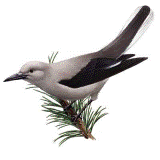Papers in the Biological Sciences
Document Type
Article
Date of this Version
5-2021
Citation
Madsen, A. E., Vander Meiden, L. N., & Shizuka, D. (2021). Social partners and temperature jointly affect morning foraging activity of small birds in winter. Behavioral Ecology, 32(3), 407-415.
Abstract
Daily foraging activity of small wintering birds is classically thought to be driven by the need to gather enough energy reserves to survive each night. A separate line of research has shown that sociality is a major driver in winter foraging activities in many species. Here, we used wintering birds as a study system to move toward an integrative understanding of the influence of energy requirements and sociality on foraging ecology. We used RFID-enabled feeders in Lincoln, Nebraska, USA in January–March 2019 to measure foraging activity in two species (downy woodpeckers, Dryobates pubescens, and white-breasted nuthatches, Sitta carolinensis). We analyzed the relationship between overnight temperature and morning foraging activity and found that lowest overnight temperature was weakly correlated with morning visitation at feeders. We then used a network approach to ask if flock associations explain similarity in birds’ foraging activity. In both species, individuals with stronger associations in a social network were more likely to share similar feeder activity, and an index of social partners’ activity explained foraging activity better than overnight temperature. This brings forth new questions about the interplay between individual response to temperature and social factors in shaping how small animals cope with harsh winter conditions.



Comments
Copyright © 2021 by the Authors. Published by Oxford University Press on behalf of the International Society for Behavioral Ecology. Used by permission.